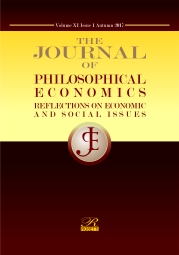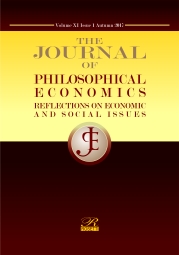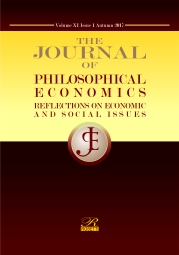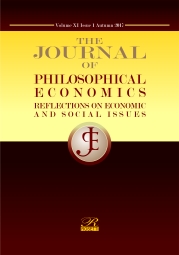
We kindly inform you that, as long as the subject affiliation of our 300.000+ articles is in progress, you might get unsufficient or no results on your third level or second level search. In this case, please broaden your search criteria.


Groups matter in our ordinary folk psychology because a part of our social interactions is done with collective entities. In our everyday life, we indeed sometimes ascribe mental states to social groups as a whole or to individuals as members of groups in order to understand and predict their behavior. The aim of this paper is to explore this aspect of social interactions by focusing on the concept of ‘collective belief’ in a non-summative sense and, more precisely, on collective belief of a specific kind of group: the political party. How can the concept of ‘collective belief’ help to understand the interactions which involve these kinds of collective entities? After providing an epistemic description of political parties, this paper focuses on the collective belief in a non-summative sense. As Gilbert says, a group believes that p, if its members are jointly committed to believe that p as a body. It is argued, with the help of an example from the political history of France, that this view can enable us to understand the interaction between political parties. More precisely, it can help clarify the way in which a political party use the rational constraints on the party as a whole and/or the social and epistemic constraints on the behavior of the group's members in order to destabilize or weaken other political parties.
More...
From the analytical point of view of Hegel's philosophical anthropology, in Kojève's interpretation, work is an existential structure through which the dual process of subjectification and socialization unfolds. For Hegel, however, this process is not taken for granted: its possibility is understood in terms of the culmination of man's conquest of humanity, taking as a point of departure the relation of mastery to servitude and the undertaking to transform this relation precisely from within the perspective of servitude. The goal of this article is to reconstruct the conceptual framework of this philosophical moment, to our mind an indispensible precondition for the apperception of our modern societies' functioning at the most fundamental level, to the extent that they consider themselves to be ‘work based societies.’
More...
This paper considers the possibility of a robust and general formulation of a model of choice for the representation of a variety of moral norms. It starts by reviewing several recent models of deontological (or rule-based) norms that retain the basic elements of the economic model of choice. It briefly examines the achievements and drawbacks of each model, and while no model is identified as the most accurate or robust, the most appealing aspects of each model contribute to the construction of a tout-ensemble utility function proposed in the final section. This representation of preferences aims to incorporate the most common qualities of both consequentialist and deontological moral norms in order to represent decision making under their influence.
More...
Amartya K. Sen’s body of work is an unrelenting project that consistently and coherently re-focuses the attention of economists and economics towards foundational questions. His capabilities framework has offered an expanded space of evaluation to directly judge the well-being of people and society. Through a detailed survey of Sen’s intellectual development, his readdressing fundamental rigidities in economic methodology, and his new framework for evaluation, this paper argues that Sen has inculcated new habits of mind, and engendered a social momentum in economic thought that takes human complexity and the richness of societal diversity into account. Creating a social momentum in economic thought through refocused habits of mind can have a sustainable impact in economics only if its scope is not sub-discipline specific, if it provides an inclusive framework, and if it builds bridges within and outside the discipline chiefly between economics and moral philosophy. Sen’s approach is pragmatic, courteous, and persuasive, but not divisive. It is expansive, yet contextual; it is humanistic. In Sen, economics is an inquiry into the nature and causes of human development.
More...
Modern economics is based on the idea that every good and service is scarce, but the standard defenses of this premise by reference to zero prices and infinite resources are invalid. The concept of scarcity is defined and used to show that ordinary scarcities are not economic scarcities. The errors regarding scarcity are traced to the methodology of modern economics, and an alternative method is suggested for a science whose subject matter is real human beings. The concept of relative scarcity is explained, and used to illuminate some important aspects of the functioning of a market economy. Some of the consequences are identified for economics if economists recognized that universal scarcity is not a fact.
More...



Capitalism as we know it presents typical dialectical features that isolate it from nature, in which real oppositions make evolution revolutionary: A dialectical metaphysics replaces the free flow of events allowing capitalist relationships but preventing the practice of materialism. Some radically sceptical issues in Hume’s Enquiry Concerning Human Understanding, Dialogues Concerning Natural Religion and A Treatise of Human Nature come useful here. A materialistic approach with complete (i.e., non-dialectical) ruptures in fact dovetails with Hume’s argument on the unpredictability of nature and the predictability of human social activities. As a consequence, a thus renewed materialistic political economy concerned with the concrete must work out its own categories dynamically, to discard them once they have been proved metaphysical.
More...
Part I of this essay explained the sequence of events that enabled the neoclassical paradigm to regain its dominant position in mainstream economics following serious challenges by ‘Keynesian’ economists. This second essay seeks to answer the question of why the economics profession was so willing to sustain the neoclassical paradigm in the face of the reality-based challenges by ‘Keynesian’ economists like Harrod and Domar. The answer is sought in the culture of economics, the history of science in general, and the study of power in the field of political economy. This article draws heavily on the work of the French sociologist Pierre Bourdieu, who divides culture into habitus (procedures and dispositions) and doxa (more abstract beliefs and philosophies), in order to provide insight into how culture affects economic thinking. Bourdieu’s concept of symbolic violence helps to explain how a narrower neoclassical growth model was enthusiastically accepted as a replacement for the ‘Keynesian’ Harrod-Domar growth model. Financial and business interests clearly understood the power of culture and they used their accumulated wealth to support the neoliberal doxa and neoclassical habitus that would induce economists to willingly provide intellectual cover for policies that benefitted those financial and business interests. We conclude with a discussion on how the history of thought on economic development might have evolved if the Keynesian paradigm, and its dynamic Harrod-Domar model, had prevailed.
More...
In his monumental masterpiece, A Treatise on Human Nature, which explains the methodology of human reasoning concerning matters of fact and describes the roles that passions and morals play in it, Hume arrives at an enormously interesting maxim: An academic controversy cannot continue for long unless the disputants assign different meanings to the major terms employed in the debate. This theory has been applied in this paper to examine the behavioural criticisms about Homo Economicus (HE), the pivotal perception in the neoclassical microeconomic model.To achieve this objective, the paper discusses the origin and evolution of the concept, reviews behavioural criticisms, summarises the main tenets of Hume’s philosophy of human knowledge and finally examines the behavioural opinions from Hume’s perspective. The paper concludes that Hume’s theory convincingly explains the reason why the HE controversy is continuing for over half century- a fact that both the mainstream and behavioural economists are ignoring
More...



The aim of this paper is twofold: first, to provide evidence supporting the thesis that Kautilya was the first political economist; second, to verify that a systematic study of political economy has begun long before the ideas and works of Adam Smith. It was in the works of Kautilya (around 375 B.C.). In order to validate the aims of our study, we look for evidence in his Arthashatra of rational behaviour, self-interest motivation, and market elements of a traditional commercial society. Providing a sound interpretation of Kautilya’s main arguments, we demonstrate that his is no less a systematic study in political economy than Smith’s The Wealth of Nations. Economics is a science that tries to offer policies and practices for creating and enriching a nation’s wealth, and in that sense, the Arthashastra (literal translation being The Science of Wealth) represents the first systematic manual of political economy. The development of economics as a science must take cognition of the economic principles and ideas presented in The Arthashastra so as to reveal the true origins of economic thought and its evolution. It is only by understanding methodological problems in a historical perspective we can understand the modern methodological and conceptual issues.
More...
This essay presents a critique of the standard ascension from the rational agent to the optimal market in economic theory. Critiques of homo economicus are found unsatisfactory on grounds that its employment allows for the prediction of essential features of actual markets. Using this same criterion we introduce Gary Becker’s essay, ‘Irrational Behavior and Economic Theory,’ which demonstrated that the same features of markets could be derived from non-rational behaviour. Thus, non-rationality is equally predictive but is less restrictive than rationality. Once the assumption of rationality is relaxed, the concept of market optimality (though not market order) must also be sacrificed.
More...

